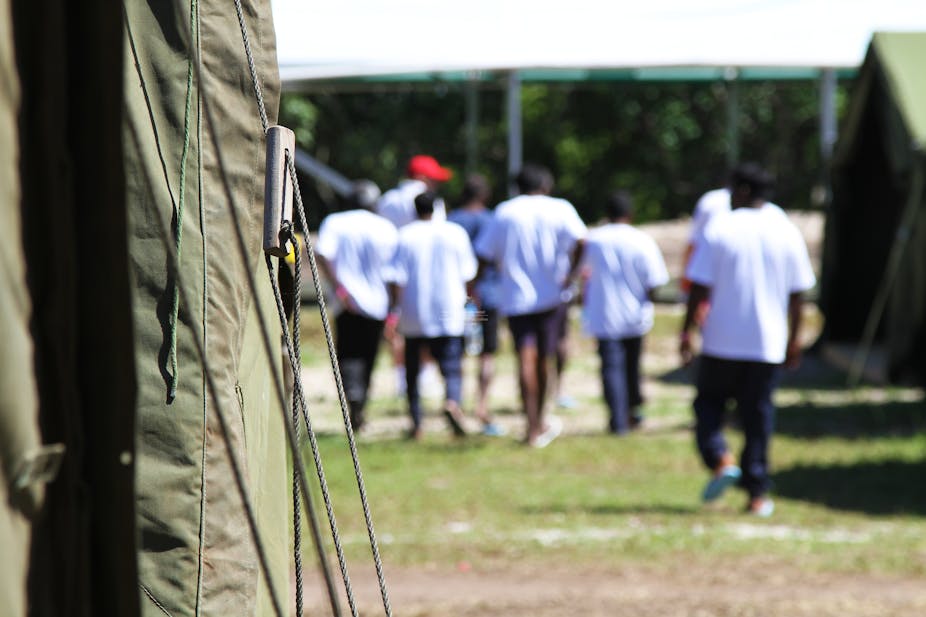Australia should respond to the extraordinary actions of the government of Nauru in deporting and terminating the employment of its only magistrate, Peter Law, and denying its Chief Justice, Geoffrey Eames, a visa to re-enter the country.
We should act to protect the rights of the asylum seekers whom we have transferred to Nauru and to uphold our obligations to act against human rights violations.
Nauruan justice minister David Adeang had declared two Nauru residents prohibited immigrants and given them a week to leave the country. They appealed to the courts and the magistrate had granted an interim injunction against the deportations. The cases were to come before the courts on Monday.
Law said:
The timing of this makes it very obvious in my mind what this is all about.
Eames said that the Nauruan government’s actions were:
…politically motivated, designed to have the decisions overturned by a new magistrate and amounted to an abuse of the rule of law.
The immediate focus of concern is the fate of about 40 asylum seekers who are facing trial in Nauru in relation to disturbances at the island state’s regional processing centre last year. Australia’s immigration minister Scott Morrison said on Monday that:
They’ll face the Nauruan courts as they have been, they’ll be subject to Nauruan law and it’s for the Nauruans to sort out this matter.
Contrary to the minister’s view, Australia still has obligations to the asylum seekers it has transferred to Nauru and Papua New Guinea. The European Court of Human Rights found in 2011 that Belgium had wrongly returned an Afghan asylum seeker to Greece. The court decided that:
Belgium and Greece have ratified the [United Nations] Refugee Convention, which defines the circumstances in which a state must grant refugee status to those who request it, as well as the rights and duties of such persons. All nationals of third countries or stateless persons have the right to apply for asylum.
Australia and Nauru have also ratified the Refugee Convention. The asylum seekers on Nauru have a right to apply for asylum in Australia, a right that has not been removed by their transfer to Nauru. Australia is obliged at the very least to ensure that the applications for asylum that the asylum seekers make in Nauru are considered in a framework of the rule of law.
The spokesperson of the UN High Commissioner for Refugees (UNHCR), commenting in July 2013 on the refugee resettlement agreement Australia had concluded with Papua New Guinea, said:
UNHCR considers that, in the context of transfer arrangements, Australia maintains a shared responsibility with PNG to ensure appropriate legal standards.
With regard to the 40 asylum seekers in the Nauruan courts, Australia and Nauru must ensure them ensure a fair trial under Article 16 of the Refugee Convention. This states:
A refugee shall have free access to the courts of law on the territory of all Contracting States. A refugee shall enjoy the same treatment as a national in matters pertaining to access to the courts.
Australia, in any case, has an obligation to take action with the Nauruan government to reverse these decisions. The UN Human Rights Committee has said that a state, such as Australia, which is a party to the International Covenant on Civil and Political Rights (ICCPR):
…must respect and ensure the rights laid down in the Covenant to anyone within the power or effective control of that State Party, even if not situated within the territory of the State Party. The enjoyment of Covenant rights must be available to all individuals, regardless of nationality or statelessness, such as asylum seekers.

International law has tended to expand the definition of “effective control”. In any case, the asylum seekers were transferred to Nauru by Australia and detained in facilities built and staffed by Australia under conditions set by Australia. By any commonsense definition, they are under Australia’s “effective control”.
Australia also has obligations as a party to the ICCPR urgently to persuade Nauru (which has signed but not ratified the covenant) to reverse these decisions. The right to a fair trial is guaranteed by Article 14 of the ICCPR.
The UN Human Rights Committee has said:
The dismissal of judges by the executive…without effective judicial protection being available to contest the dismissal is incompatible with the independence of the judiciary.
But is Australia entitled to raise this issue with the government of Nauru? The International Court of Justice decided in 2012 that Belgium could intervene in Senegal’s failure to prosecute a case of alleged torture in Senegal. This was because all states that are parties to one of the human rights conventions have “a common interest in compliance with the obligations” under the Refugee Convention. The court found that this imples that:
…the obligations in question are owed by any State party to all the other States parties to the Convention. It follows that all the States parties “have a legal interest” in the protection of the rights involved.
Australia owes obligations to the asylum seekers we have transferred to Nauru and we have a legal interest in the maintenance of the rule of law in Nauru. The Australian government should intervene urgently with the government of Nauru to reverse its dismissal of Peter Law and its prevention of the return of Geoffrey Eames to Nauru.

